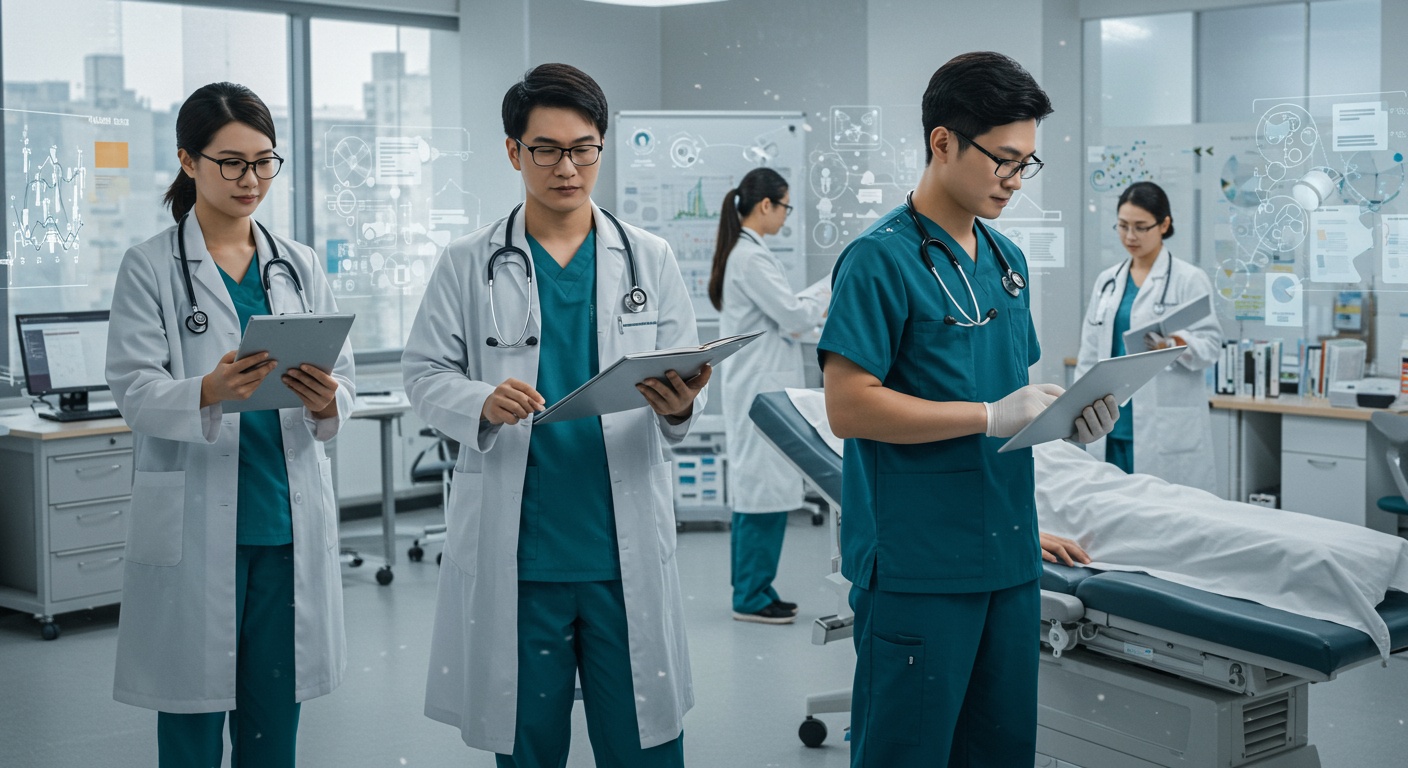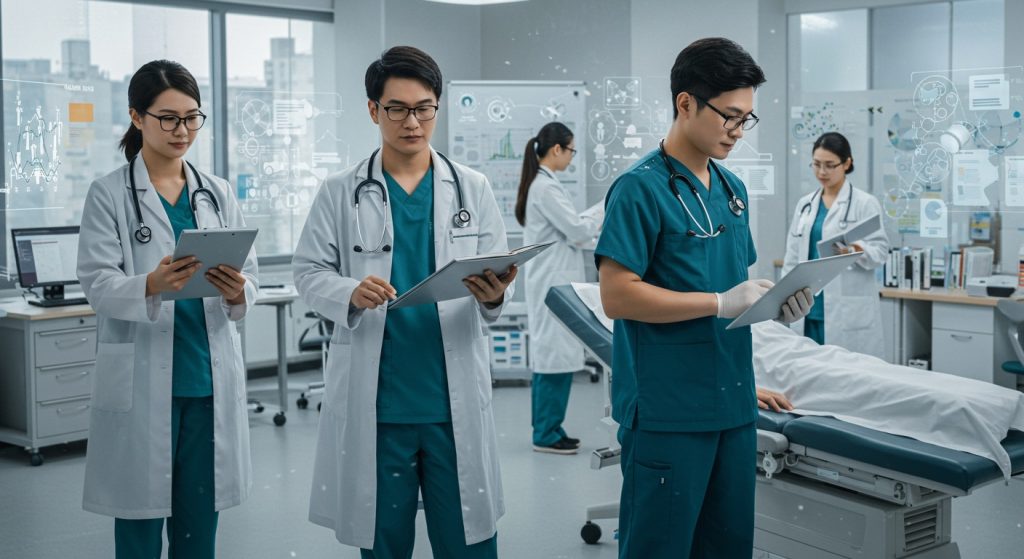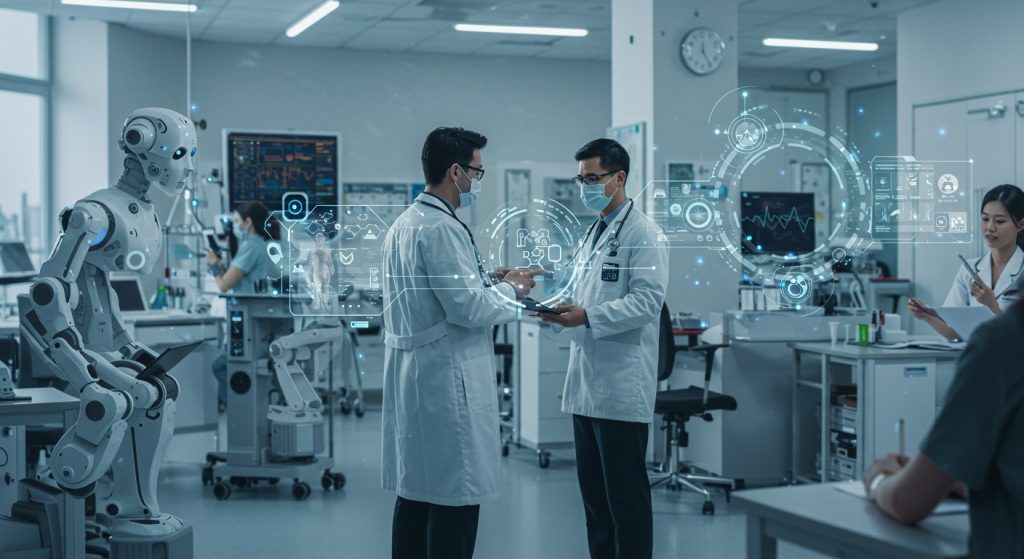The landscape of modern medicine demands more than just diagnostic prowess. As healthcare shifts towards patient-centered, technology-driven models, doctors require a refined skillset beyond traditional clinical knowledge. This exploration reveals the essential non-technical competencies needed to excel. We’ll delve into the power of effective communication, emphasizing techniques to build rapport and navigate difficult conversations, critical in today’s diverse patient populations. Ethical decision-making, leadership strategies for collaborative teams. Strategies for combating burnout will also be examined. Ultimately, we will address how to integrate these skills, fostering resilience and adaptability for a fulfilling and impactful medical career, preparing you for the evolving demands of 21st-century healthcare.

The Ever-Evolving Landscape of Medicine
Medicine is not static. It’s a constantly evolving field driven by technological advancements, new research. Changing patient demographics. To thrive in this dynamic environment, tomorrow’s doctors need a skillset that goes beyond traditional medical knowledge. They must be adaptable, lifelong learners. Possess strong interpersonal and technological skills. The traditional path of choosing an Engineering vs Medical Career is now being augmented by engineers entering the medical field and doctors using engineering principles.
Critical Thinking and Problem-Solving
At the heart of medical practice lies the ability to examine complex situations and make informed decisions. Critical thinking enables doctors to:
- Evaluate medical literature and research findings.
- Differentiate between reliable and unreliable sources of insights.
- Formulate accurate diagnoses based on patient history, physical examination. Diagnostic tests.
- Develop effective treatment plans tailored to individual patient needs.
- Recognize and manage unexpected complications.
Problem-solving skills are equally crucial. Doctors face a multitude of challenges daily, from diagnosing rare conditions to managing chronic illnesses. They need to be able to think creatively and systematically to find the best solutions for their patients.
Communication and Interpersonal Skills
Effective communication is paramount in building trust and rapport with patients. Doctors need to be able to:
- Listen actively and empathetically to patients’ concerns.
- Explain complex medical data in a clear and understandable manner.
- Communicate effectively with colleagues, including nurses, pharmacists. Other healthcare professionals.
- Work collaboratively as part of a multidisciplinary team.
- Navigate cultural differences and language barriers.
Strong interpersonal skills also involve empathy, compassion. The ability to build strong relationships with patients and their families. This includes understanding their emotional needs and providing support during difficult times.
Technological Proficiency
Technology is rapidly transforming healthcare. Doctors need to be comfortable using a variety of digital tools and platforms. This includes:
- Electronic Health Records (EHRs): EHRs are digital versions of patients’ paper charts. They allow doctors to access patient insights quickly and easily, track their progress over time. Coordinate care with other providers.
- Telemedicine: Telemedicine uses technology to provide healthcare remotely. This can be particularly useful for patients in rural areas or those who have difficulty traveling to see a doctor in person.
- Artificial Intelligence (AI): AI is being used in a variety of ways in healthcare, from diagnosing diseases to developing new treatments. AI can also help doctors make better decisions by providing them with access to vast amounts of data and insights.
- Robotics: Robotic surgery is becoming increasingly common. Robots can perform complex procedures with greater precision and accuracy than humans, leading to better outcomes for patients.
- Wearable Technology: Wearable devices, such as smartwatches and fitness trackers, can collect data on patients’ vital signs and activity levels. This data can be used to monitor their health and identify potential problems early on.
Doctors don’t need to be programmers. They should comprehend how these technologies work and how they can be used to improve patient care. A basic understanding of data analytics is also becoming increasingly crucial, as doctors need to be able to interpret data from EHRs and other sources to make informed decisions. The intersection of engineering principles and medical practice, as seen in the development of these technologies, highlights how an Engineering vs Medical Career choice isn’t always mutually exclusive.
Data Analysis and Interpretation
With the increasing volume of patient data generated through EHRs, wearable devices. Other sources, doctors must be able to interpret and examine this data effectively. This includes:
- Understanding basic statistical concepts.
- Identifying patterns and trends in patient data.
- Using data to improve patient outcomes.
- Evaluating the effectiveness of treatments and interventions.
Data analysis skills are not just for researchers; they are essential for all doctors who want to provide the best possible care for their patients.
Leadership and Teamwork
Doctors are often leaders of healthcare teams, responsible for coordinating the care of patients and managing other healthcare professionals. This requires strong leadership and teamwork skills, including:
- Delegating tasks effectively.
- Motivating and inspiring others.
- Resolving conflicts.
- Building consensus.
- Communicating effectively with team members.
Doctors also need to be able to work effectively as part of a multidisciplinary team, collaborating with nurses, pharmacists, therapists. Other healthcare professionals to provide comprehensive care for patients.
Ethical and Legal Considerations
Medicine is a profession governed by strict ethical and legal guidelines. Doctors need to be aware of these guidelines and adhere to them in their practice. This includes:
- Understanding the principles of medical ethics, such as beneficence, non-maleficence, autonomy. Justice.
- Protecting patient confidentiality.
- Obtaining informed consent from patients before treatment.
- Adhering to legal regulations related to medical practice.
Ethical dilemmas are common in medicine. Doctors need to be able to navigate these challenges with integrity and sound judgment.
Resilience and Adaptability
The medical profession can be demanding and stressful. Doctors need to be resilient and adaptable to cope with the challenges they face. This includes:
- Managing stress effectively.
- Maintaining a healthy work-life balance.
- Adapting to changing technology and healthcare policies.
- Learning from mistakes and setbacks.
Resilience is not just about surviving; it’s about thriving in a challenging environment. Doctors who are resilient are better able to provide high-quality care for their patients and maintain their own well-being.
Lifelong Learning
Medical knowledge is constantly evolving. Doctors need to be committed to lifelong learning to stay up-to-date with the latest advances in medicine. This includes:
- Attending conferences and workshops.
- Reading medical journals and textbooks.
- Participating in continuing medical education (CME) activities.
- Seeking out mentors and colleagues who can provide guidance and support.
Lifelong learning is not just about acquiring new knowledge; it’s about maintaining a curious and open mind and being willing to challenge existing assumptions.
Cultural Competency
With increasing globalization, doctors are more likely to encounter patients from diverse cultural backgrounds. Cultural competency involves:
- Understanding different cultural beliefs and practices related to health and illness.
- Communicating effectively with patients from different cultures.
- Providing culturally sensitive care.
- Recognizing and addressing health disparities.
Cultural competency is essential for providing equitable and effective care for all patients.
The Future of Medical Skills
Looking ahead, several emerging skills will become even more critical for doctors. These include:
- Genomics and Personalized Medicine: Understanding how genes influence health and disease will allow doctors to tailor treatments to individual patients.
- Nanotechnology: Nanotechnology has the potential to revolutionize medicine, from drug delivery to diagnostics.
- Big Data Analytics: The ability to assess vast amounts of data will be essential for identifying new treatments and improving patient outcomes.
- Virtual and Augmented Reality: VR and AR can be used for training, patient education. Even surgery.
The skills required to thrive in a medical career are constantly evolving. By developing these essential skills, tomorrow’s doctors can be well-equipped to meet the challenges and opportunities of the future and provide the best possible care for their patients. The intersection of fields, blurring the lines between an Engineering vs Medical Career, will only continue to shape the future of healthcare.
Conclusion
Looking ahead, the evolving medical landscape demands more than just clinical expertise. Having explored the essential skills needed to thrive in this dynamic field, consider this your success blueprint. Beyond mastering diagnostic tools and treatment protocols, your ability to empathize, communicate effectively. Collaborate seamlessly will define your impact. Don’t underestimate the power of continuous learning. Personalized medicine, AI-driven diagnostics. Telehealth are rapidly reshaping healthcare delivery. Proactively seek opportunities to enhance your digital literacy and embrace these technological advancements. Remember that burnout is a significant challenge in medicine. Prioritizing self-care, building resilience. Fostering strong support networks are crucial for long-term well-being and professional fulfillment. Embrace mentorship, both as a mentee and a mentor, to cultivate a culture of growth and collaboration. As you navigate your medical career, let empathy be your compass, knowledge your tool. Resilience your armor. Strive not just to treat diseases. To heal individuals and contribute to a healthier future.
More Articles
Top Research Universities in Europe: A 2025 Guide for Aspiring Scholars
Beyond Coding: Diverse Career Avenues After a BSc in Computer Science
Unlock Your Potential: Networking Events for Career Growth in 2025
Thriving Remotely: Top High-Paying Remote Work Career Opportunities
FAQs
Okay, so ‘essential skills’ sounds crucial. What specifically are we talking about beyond just, you know, being a good doctor?
Great question! It’s not just about memorizing anatomy anymore. Think beyond the textbook: communication (with patients AND colleagues), leadership, teamwork, adaptability to new technologies, ethical decision-making. A big one – resilience to cope with the inherent stresses of the job. It’s about being a well-rounded human, not just a walking encyclopedia of medical facts.
I’m pretty good at science. I’m not exactly a ‘people person’. Can I still make it as a doctor?
Honesty is the best policy! While a love for science is crucial, patient interaction is a HUGE part of the job. Being empathetic, listening effectively. Explaining complex medical data in a way patients grasp are key. The good news is, communication skills can be learned and improved! There are workshops, simulations. Mentorship opportunities specifically designed to help you build these skills.
What role does technology play? I hear AI is going to replace doctors. Is that true?
AI isn’t going to replace doctors, at least not anytime soon. Think of it as a powerful tool. Knowing how to use AI for diagnostics, treatment planning. Research is becoming increasingly vital. Doctors need to comprehend the strengths and limitations of these technologies to leverage them effectively and ethically. It’s about augmenting your abilities, not being replaced!
How crucial is teamwork, really? I always thought doctors were lone wolves making all the decisions.
That’s an outdated stereotype! Modern medicine is all about collaboration. You’ll be working with nurses, specialists, therapists. Many others. Strong teamwork skills – communicating clearly, respecting different viewpoints. Resolving conflicts constructively – are essential for providing the best patient care. A well-oiled team delivers better outcomes.
Ethical decision-making… that sounds heavy. What kind of ethical dilemmas are we talking about?
You’re right, it can be weighty stuff! Think about situations involving patient confidentiality, end-of-life care, resource allocation, or emerging technologies like gene editing. Doctors often face complex situations with no easy answers, so developing a strong ethical framework and the ability to reason through these dilemmas is absolutely critical.
Resilience? What if I’m not naturally a super-tough person? Can resilience be learned?
Absolutely! Resilience isn’t about being immune to stress; it’s about how you bounce back from it. It involves developing coping mechanisms, practicing self-care (which is NOT selfish!) , building a strong support network. Learning to manage your emotions effectively. Think of it as building a mental and emotional toolbox to handle the challenges of a demanding career.
Okay, so how do I actually develop these skills while I’m still in school or training? Any practical tips?
Definitely! Look for opportunities to participate in simulations, volunteer in healthcare settings, join medical student organizations, seek out mentorship from experienced physicians. Actively practice your communication skills with friends and family. Don’t be afraid to ask for feedback and identify areas where you can improve. Every little bit helps!



